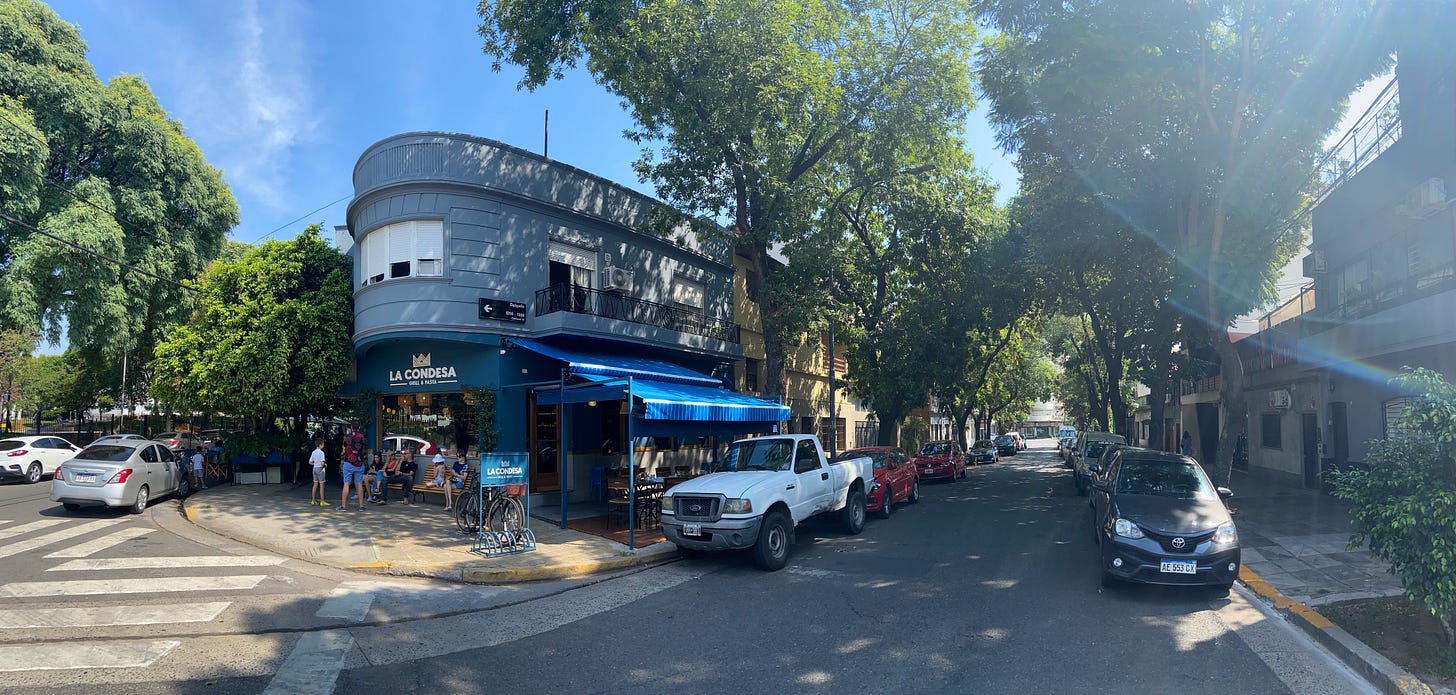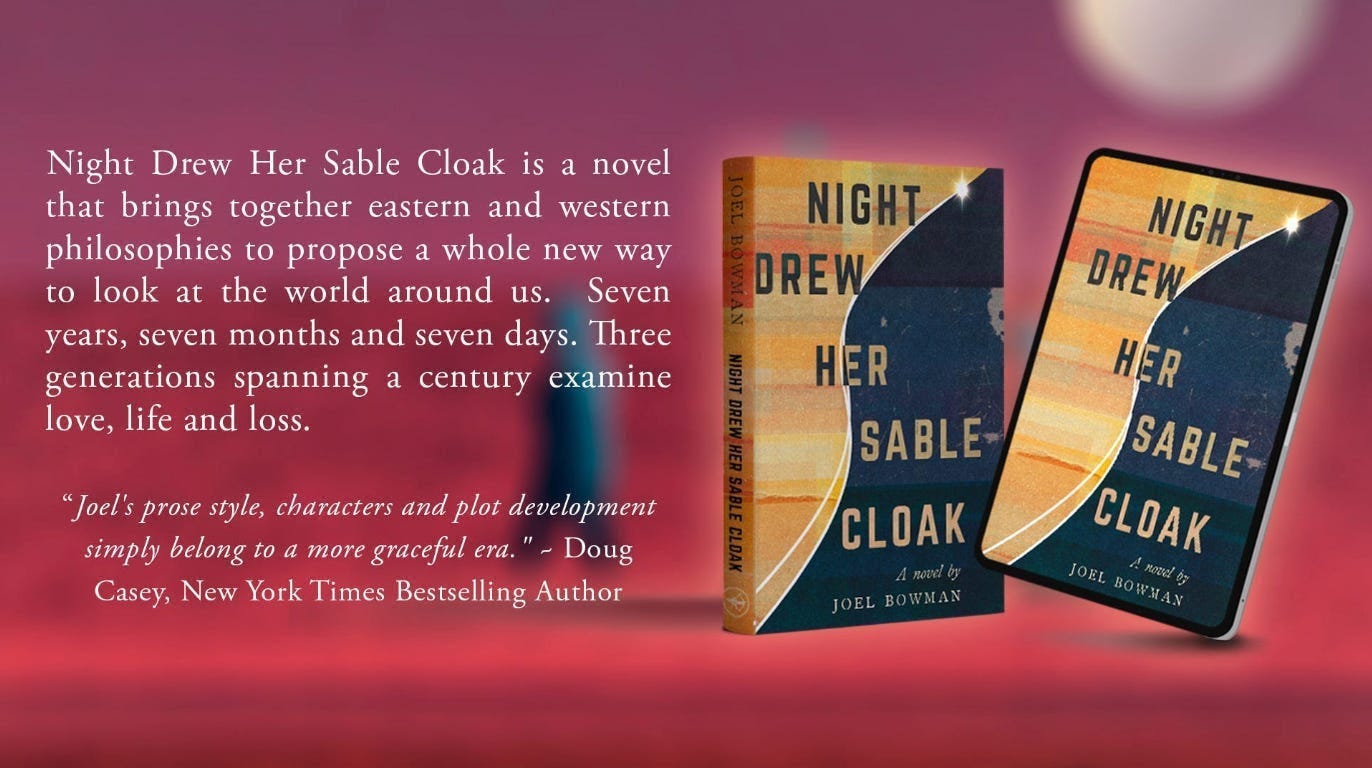“Time is the substance I am made of. Time is a river which sweeps me along, but I am the river; it is a tiger which destroys me, but I am the tiger; it is a fire which consumes me, but I am the fire.”
~ Jorge Luis Borges, A New Refutation of Time
Joel Bowman with today’s Note From the End of the World: Syros, Greece…
Something a little different for you this supple, soporific Sunday, dear reader. Rumors abound, you see, scuttlebutt screeches up and down the virtual Substack halls.
There is a “resurrection” in literary fiction, you see, presumably precipitated by the much-ballyhooed “vibe shift” in American culture. Books are back, in other words.
And not just the Seven Secrets of Successful CEOs kind, either. We’re talking about real books, as in novels… with descriptions that begins in the writer’s mind and manifest in the reader’s… with prose that reads as though it were penned in the midst of a waking dream… with lines so lush you forget you were reading at all, and ponder how the writer is able to transcribe your very thoughts, one by one by…
Literature is “so back,” as
of , observed in a recent column. Let’s hope so! For writers here on Substack, the sands are shifting. Here’s , writing inBeing a fiction writer on Substack isn’t much like being one in the traditional literary world. In that world, there are orderly processes for getting your work into people’s hands. You submit to agents or editors. They publish your work in places where people expect to see fiction: literary journals and the fiction section of the bookstore.
[…]
There are many great fiction writers on Substack, including some who are experimenting with form and genre and seducing their readers into coming along for the ride.
As patient readers of these Notes can attest, in between the vocational hazards inherent in covering geopolitics… and the vampiric personalities pulling the strings in that eternally enervating arena… your editor is really a tragically unreconstructed romantic, one who can’t help but search for salvation in the wonderful world of ideas.
We’re currently penning a third work of fiction (set right here, on Greece’s windswept islands, as you might have guessed), but in the meantime, we thought it might be worth trying to catch a prevailing zephyr of interest in our preferred genre, literary fiction.
Herewith, please enjoy an excerpt from our second novel, Night Drew Her Sable Cloak. If you would be so kind, please do give it a like, share or restack. As
swells from a pond to a mighty ocean, every ripple counts…We’ll return with your regular Notes, next week…
Down on the Corner
In a world without time, we gather at a corner parrilla in the leafy Belgrano barrio, right across from the plaza. We are seven, our little group, including the children, no younger than us. Overhead, the sun shines eternal, threading the umbrageous jacarandas to land on the cobblestones in hazy, mottled splotches. Whiffs of fatty sausages and fried potato linger on the cool breeze. It is fall, as always.
The waitress, a wiry-framed woman with skin like Tuscan grapes, arrives with dos pingüinos – ceramic penguin pitchers filled with cheap, sloshing malbec. She smiles as she listens to our preferences, writing nothing down. An open window frames her honeyed hair, long and unkempt, in blue and peeling paint. She waves to a cyclist, blushing as he passes.
Our unhurried lunch is the same as always; salchicha and blood sausage for starters, with chilled vermouth and siphon soda, then ribeye and strip steak to share, bien jugoso, accompanied by arugula greens with shaved parmesan and sun-dried tomatoes and, of course, those perennially purging pingüinos. The basket of papas fritas, glistening with oil and garlic a la provençal, passes from hand to happy hand.
Between the laughter and the tears, I think of a preface I am writing for my latest novel. Far from the corner parrilla, down the cobblestone streets, past the tired shopfronts, in a circle whose center is everywhere, I begin to order my ideas, to compose the lines, word by word...
From the Preface…
All literature is, finally, autobiographical. So observed the incomparable giant of twentieth century letters, Jorge Luis Borges. Dear readers will kindly forgive our presumption in offering an addendum to Sr. Borges’s after all truthful words: All autobiography is, finally, fictional.
Owing to the poverty of pure recollection, that conniving membrane through which all memory escapes its historical setting, wherein it is pick-pocketed, molested, exaggerated and distorted to Procrustean proportions, the past appears to us as an impression of an impression (of an impression, ad infinitum), a reflection in a hall of mirrors, a vaguely familiar juncture, buried deep in a Borgesian labyrinth. Vainly do we grasp at an image, a smell, a sensation. And as our fist clenches the sweet seawater of youth, freely does it flow from our palms, into time’s limitless ocean, eternally one with past, present and future.
Inspired by his famous “madeleine moment,” the mighty Marcel Proust spent thirteen years “in search of lost time,” reanimating the events of a life over a million and a half words spanning seven weighty volumes. And yet, from the finest grain of Balbec sand to the coquettish glint in Odette’s eye to the texture of the letter sent from Albertine’s aunt, even the penetrating exactitude of the author’s pen can but hope to emulate those now timeless moments. (To say nothing of the impressions on impressions wrought by subsequent translators, skilled though they undoubtedly were.)
All autobiography is, finally, fictional.
And yet, we do not create from nothing, but rather remake the world around us. We do not invent, only rearrange. We do not ourselves cease to be, only yield to the constant, universal change around us. This phenomenon the ancients knew well. “Nothing comes from nothing,” declared Empedocles. “The totality of things was always such as it is now, and always will be,” stated Epicurus. “Change is the only constant,” observed Heraclitus.
Modern physicists, too, have agreed on as much, formulated as the principle of mass conservation. But what say our metaphysicians? What of the world behind the world, that mysterious governing realm of universal laws, concepts and murky abstractions? When we summon the past, or fragments thereof, conscripting soldierly facts for our stories, our wild tales and world building fantasies, are we not merely shuffling memories from one place to another, rearranging experiences, plumbing perpetual permutations, filtering them through our imperfect minds, rusty from disuse and dark as a dead end in Minos’s bewildering maze?
Whether by sleights of commission or omission, all attempts at faithful recollection are mere simulacrums of a discrete moment in time, unique and unrepeatable, a transmogrification unrecognizable to the denizens of that other realm, no less abstruse to them as our own future is to us...

Full Circle
Over sweet, sticky flan and steaming cortados, coffee “cut” with milk, there is talk of fire and rivers and tigers. The sun falls on naked forearms, sleeves rolled leisurely to the elbow. In the nearby plaza, a cunning diabolist takes his makeshift stage, thrilling spectators with clockwork rabbits and hoops without circumferences and ropes without end. The adults laugh the loudest.
Emerging from the fading embers, hands darkened with coal and grease, face flushed with fire and Fernet, the asador takes in the fall sun from the stoop. The open door frames his bald head, shimmering with beaded sweat. He waves to a cyclist, doffing an imaginary cap as she passes, full circle.
From across the table, I behold my wife, essential, constant, vital. Once again, the Argentine’s words flood my mind. “Being with you and not being with you is the only way I have to measure time.”
Me too, I think. Me too.
A Diós.
Joel Bowman
P.S. Have you already downloaded our second novel, Night Drew Her Sable Cloak? It’s available for Notes Members in our “Books” section, here. Members also get our debut novel, Morris, Alive. And all upcoming efforts with the quill (we’re working on a third, pre-award winning novel presently)…
Support independent authorship for just a few bucks ($5.83/month, to be precise) and download Night Drew Her Sable Cloak and Morris, Alive here…






I do not understand Borges definition of time. I imagine time is individual, depending, as Shakespeare says, what part you are playing at any time. We all play many parts as we play out time.
Fiction is experience. When anyone does as Hemingway advised, “Write the story as well as you can and reach the fifth dimension,” the metaphysical, where truth is, eternal truth.
Ideas might be salvation, but there is nothing new under the sun, the best ideas have been written for thousands of years. No one reads them; they are overridden by noxious sound bites.
Indeed, the blossoming Substack is mostly fiction and ever increasing ranting.
I liked “Morris.” I liked the hand of fate that was so bounteous and the story of Baltimore, families, people; I even found the wise Bill Bonner in there. It kept me wondering about the girl that seemed to be out of the song by Harry Chapman, “She will always be seventeen.”
The stories of Sable were great. I guess you went through that child birth ordeal miracle or else fiction is not autobiographical. I still wonder about the China story, as if there should be a sequel.
I now view time as eternal and wonder whether too much of it is a blessing. How do you fill eternity?
At 83 I relax into time. Maybe, if I had some urgent business or goal, I could revert to being obsessed with it.
Glad you are writing another book.
Joel, by now, you must know I’m a loyal fan. I’ve read both your books, “Morris, Alive” twice. It, I chose for our book club. I am but a child seated at your feet in the presence of your intellect. Who am I to judge? Sometimes, however, I sense your literary wanderings stop me on the path, feeling mentally replete; mind you, that’s not a bad thing.